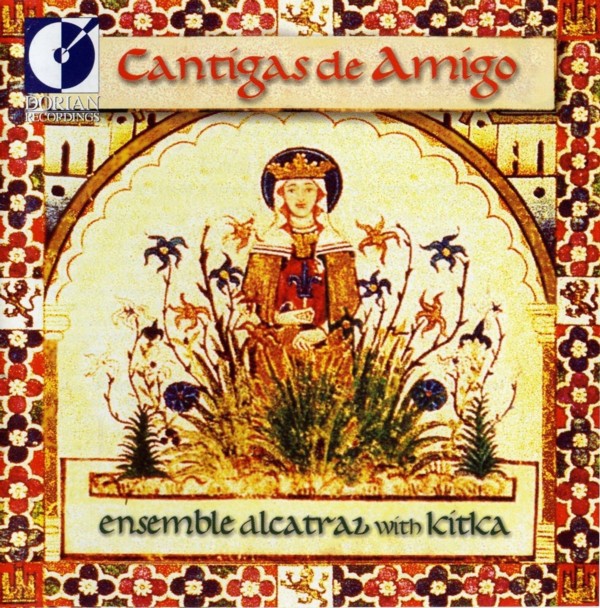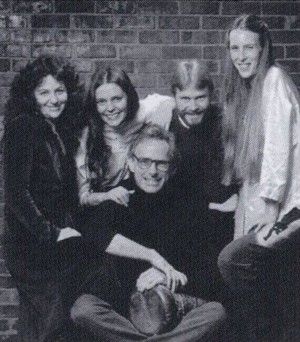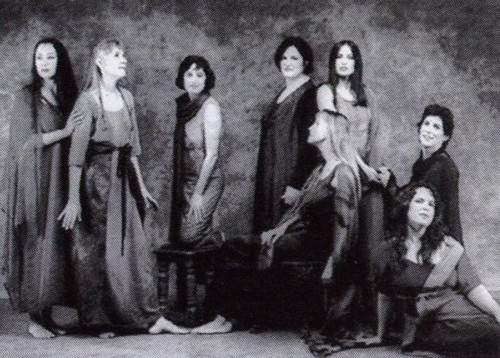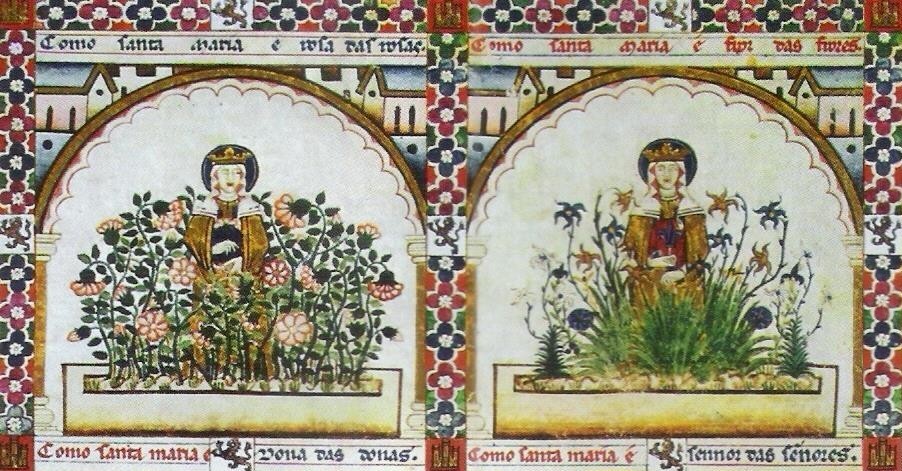
medieval.org
amazon.com
Dorian Recordings DOR-90 285
2000

medieval.org
amazon.com
Dorian Recordings DOR-90 285
2000
1. Sen calar [5:19]
CSM 380 arr. Fulton
2. Alborada [2:38] traditional Galician
3. Sen meu amigo [4:15] text: Juao Bolseiro / tune: Kammen
4. Alvorada [3:08] inspired by traditional Portuguese melodies, arr. Higginson
5. Enas verdes ervas [6:18] text: Pero Meogo / tune: Kammen
6. Por Deus [2:38] text: Martin de Padrozelos / tune: traditional Catalan
7. Instrumental #11 [8:35] a fantasia on
CSM 11 “Macar ome per folia”
arr. Fulton / Higginson / Kammen / Maund
8. Levantous' a velida [1:41] text: King Dinis / tune: Higginson
9. Bailemos nos ja todas [4:16] text: Airas Nunes de Santiago / tune: Higginson
Martin CODAX (fl. c. 1230). Cantigas de Amigo
10. Ondas do mare [5:00]
ca I
11. Mandad' ei comigo [1:23]
ca II
12. Mia irmana fremosa [2:26]
ca III
13. Ai Deus, se sab' ora meu amigo [4:20]
ca IV
14. Quantas sabedes amare amigo [2:21]
ca V
15. Eno sagrado en Vigo [3:46]
ca VI / tune:
CSM 384
16. Ai ondas eu vin veere [2:25]
ca VII
17. Rosa das rosas [5:03]
CSM 10 arr. Fulton
All arrangements by Ensemble Alcatraz except when noted.
ENSEMBLE ALCATRAZ
Cheryl Ann Fulton — harps
Kit Higginson — recorders, psaltery
Shira Kammen — vielle, rebec
Peter Maund — percussion
Susan Rode Morris — soprano
with Kitka
Leslie Bonnett • Shira Cion • Catherine Rose Crowther • Deborah Dietrich
Juliana Graffagna • Janet Kutulas • Ann Moorhead • Lily Storm
and special guest artist Bon Singer
also with members of Angelorum
Betty Nelson • Diana Rowan • Eva Palviainen — harps
A Note On The Recording
 ENSEMBLE ALCATRAZ presents innovative performances of medieval
and Renaissance music. Based in the San Francisco Bay Area since 1984,
the group has performed throughout North America and in early music
festivals in Europe. Their two recordings, Visions and Miracles and Danse Royale
(Elektra/Nonesuch) have brought them high praise and critical acclaim.
The five members of Ensemble Alcatraz are all internationally recognized
specialists in early music who combine scholarship with imagination,
virtuosity and musicality.
ENSEMBLE ALCATRAZ presents innovative performances of medieval
and Renaissance music. Based in the San Francisco Bay Area since 1984,
the group has performed throughout North America and in early music
festivals in Europe. Their two recordings, Visions and Miracles and Danse Royale
(Elektra/Nonesuch) have brought them high praise and critical acclaim.
The five members of Ensemble Alcatraz are all internationally recognized
specialists in early music who combine scholarship with imagination,
virtuosity and musicality.
Cheryl Ann Fulton is America's premier performer of historical harps, in particular medieval harp, arpa doppia
and Welsh triple harp, as well as an inspiring and popular performer of
Celtic and contemporary music on lever harp. Her first solo album, The Airs of Wales,
Welsh Airs performed on an original Welsh triple harp, brought her
international recognition and acclaim as a "genuine virtuosa of her
instrument." Dr. Fulton, one of the leading experts in the field of
medieval and Baroque harp research, holds graduate degrees from the
Early Music Institute of Indiana University where she studied with and
assisted Thomas Binkley. She balances her music career with riding her
Arabian horse Fazon and enjoying time with her husband, vintner Robert
Boggs and their dogs.
Kit Higginson, recorder and
psaltery, is known to audiences in North America and Europe both as a
soloist and ensemble player. He holds a Bachelor of Music degree from
California State University, Northridge and has studied privately with
Eva Legene. In addition to his appearances with Ensemble Alcatraz, he
has performed with Philharmonia Baroque Orchestra, the Los Angeles
Chamber Orchestra, the Oregon Bach Festival, Anne Azema, the Boston
Camerata and the Lauren Pomerantz Ensemble. Mr. Higginson also served as
the producer of two CDs for Kitka, Voices on the Eastern Wind and Nectar.
Shira Kammen
received her degree in music from UC Berkeley and studied vielle with
Margriet Tindemans. A member for many years of Ensemble Alcatraz,
Project Ars Nova, and Medieval Strings, she has also worked with
Sequentia, Hesperion XX, the Boston Camerata, and the King's Noyse, and
is the founder of Class V Music, an ensemble dedicated to performance on
river rafting trips. She has performed and taught in the U.S., Canada,
Europe, Israel, Morocco and Japan, and on the Colorado and Rogue rivers.
Shira happily collaborated with singer/storyteller John Fleagle for
fifteen years, and performs now with several new groups: a medieval
ensemble, Fortune's Wheel; a new music group, Ephemeros; an eclectic
ethnic band, Panacea; and Trouz Bras, a band devoted to the dance music
of Celtic Brittany.
Peter Maund studied percussion at the
San Francisco Conservatory of Music; tabla at the Ali Akbar College of
Music; and music, folklore, and ethnomusicology at the University of
California, Berkeley. He has performed and recorded with various early
music, contemporary music, and world music ensembles throughout North
America, Great Britain, Europe and Israel. In addition to his work with
Ensemble Alcatraz he is a member of Davka and Alasdair Fraser's
Skyedance, and he often gives lectures, workshops, and classes in the
United States, Canada and Scotland.
Susan Rode Morris, a
native of the San Francisco Bay Area, has received much acclaim for her
expressiveness and naturalness in singing and her communicative
presence. She has sung with many ensembles including Philharmonia
Baroque, American Bach Soloists, Sequentia, Magnificat, Sex Chordae
Consort of Viols and others. She starred in the San Francisco Bay
Christmas Revels with Scottish fiddler Alasdair Fraser, which inspired
an interest in eighteenth-century Scottish music. Her recordings Among the Lasses (Songs of Robert Bums) and Between the Late & Early
(Romantic Songs of Robert Burns) were played on National Public Radio's
show, Performance Today, on Burn's birthday. In 1992 she founded her
own label, Donsuemor, on which she has released three CDs with
harpsichordist Phebe Craig. She also owns a bakery business which
supplies the country with fresh madeleines.
 Kitka Women's Vocal Ensemble
Kitka Women's Vocal Ensemble
Recognized
by the National Endowment for the Arts as one of America's premier
ensembles and by numerous Eastern European musical authorities as the
foremost interpreter of Balkan and Slavic choral repertoire in the
United States, Kitka is composed of women from diverse cultural and
musical backgrounds who share a passion for the stunning dissonances,
asymmetric rhythms, intricate ornamentation, lush harmonies, and
resonant strength of Balkan and Slavic women's vocal music. Kitka's
repertoire ranges from strident chants sung in the open-throated village
style, to complex contemporary choral works inspired by ancient
extended vocal techniques. Kitka's voices have been featured on several
major motion picture soundtracks including Jacob's Ladder and Braveheart.
The group recently received critical raves on both coasts for their
role as the Greek Chorus/Trojan Slave Women in the American Conservatory
Theater's production of Hecuba, starring Olympia Dukakis. Based
in the San Francisco Bay Area since 1979, Kitka has released four
recordings on their own Diaphonica record label, most recently Nectar, a disc hailed by rock superstar David Crosby as "a true masterpiece."
A
frequently occurring feminine symbolic image in Balkan folk songs,
"Kitka" (pronounced KEET-kah) means "bouquet" in Bulgarian and
Macedonian. Kitka has enjoyed a fruitful collaborative relationship with
the musicians of Ensemble Alcatraz since 1990.
Angelorum Medieval Harp Choir
Angelorum,
the world's only medieval harp choir, is directed by Cheryl Ann Fulton.
First formed in 1996, Angelorum is based in the San Francisco Bay Area
and has performed for the Festival of Harps and the Berkeley Early Music
Festival 2000. In February 2000 Angelorum joined Chanticleer for a
production of the Resurrection Play of Tours directed by Fred Renz.
Instruments of Ensemble Alcatraz
Medieval harp by Rainer Thurau (Germany)
Medieval harp by David Brooks (USA)
Medieval harp by Patti Pike (USA)
Psaltery by David Brooks (USA)
Psaltery by Lyn Elder (USA)
Vielle by Fabrizio Reginato (Italy)
Vielle by Karl Dennis (USA)
Rebec by John Fleagle (USA)
Soprano Recorder by Peter Kobliczek (Germany)
Soprano Recorder by Friedrich von Huene (USA)
Alto Recorder by Philip Levin (USA)
Bendir (Morocco)
Frame Drums by Abdulhamid Alwan (USA) Tambourine (Egypt)
Zarb (Iran)
Harps of Angelorum
Two Medieval harps by Patti Pike (USA)
Medieval harp by Winfried Goerge (Germany)
This
recording, like all Dorian Recordings discs, was produced with no
dynamic-range compression using Dorian's custom record electronics, our
one-of-a-kind 24-bit analog-to-digital converters and minimal
microphony. The dynamic structure of the original performance has been
preserved in this recording such that the natural musical dynamics, from
pianissimo to fortissimo, are reproduced fully and accurately. This
does not mean that the recording was made at a level different from
conventional recordings. Rather, since the maximum dynamic level of all
CDs is fixed and the dynamic range of this recording is wider than with
conventional recordings, its average playback level might appear to be
at a different level than the average level of other recordings. Simply
adjust the volume control on your audio playback system so that average
dynamic levels are reproduced at a comfortable listening level, and this
recording will yield the full spectrum of sound with startling clarity
and full dynamic resolution and impact.
Cantigas de Amigo
Catalog No. DOR-90285
Recorded at Skywalker Sound in Marin, CA in November 1999.
Session Producer: Angela Mariani
Engineers: Craig D. Dory, Joseph F. Korgie
Post-Session Producer: Kit Higginson
Editors: Debbie Reynolds, Joseph F. Korgie
English Song Text Translations: Julieta Zúñiga
Booklet Preparation & Editing: Katherine A. Dory
Graphic Design: Kimberly Smith Co.
Cover: a panel from the illumination for Rosa das rosas (Cantigas de Santa Maria manuscript)
© Patrimonio Nacional (Madrid, Spain)
Executive Producer: Brian M. Levine
Special
thanks to Angela Mariani, Julieta Zúñiga, John Harding Fingado, Luis
Ponce de León, Leslie Ann Jones, Dann Michael Thompson, Marianne
McDonald and Susan Snyder.
℗ © 2000 DORIAN RECORDINGS®

Cantigas de Amigo
Notes by Cheryl Ann Fulton and Kit Higginson
The cantigas de amigo
form the greatest collection of women's songs from medieval Europe.
These songs of love and longing for the absent beloved were composed,
mostly by men, throughout thirteenth-century Spain, particularly in the
region of Santiago de Compostela, a favorite pilgrimage site, and in
Portugal under the patronage of King Dinis (d.1325), grandson of Alfonso
X. Alfonso X, King of Leon and Castile (1252-84) wrote secular songs (cantigas profanas), including cantigas de amigo as well as love songs (cantigas de amor) and songs of mockery and slander (cantigas de escarnio and cantigas de mal dizer), but his songs of devotion, the Cantigas de Santa Maria,
comprise the most magnificent collection of medieval sacred songs
written in the vernacular. Assembled by the king and his collaborators,
many authored by Alfonso himself, these songs number over 400 in all.
Most of the song texts tell stories of the miracles of Holy Mary (cantigas de miragres) and about 40, two of which are included in this program, sing her praise (cantigas de loor). This monumental anthology is a unique tribute to the Divine Feminine as embodied by Holy Mary.
A cantiga
is simply a song in Galician-Portuguese, the preferred, poetic language
of the medieval Iberian peninsula which developed into Modern Galician
and Portuguese. Cantigas, both sacred and profane, were preserved in cancioneiros,
book of poems or anthologies of songs. Their origins, however, lie in
the oral traditions rooted in Galician folk lyric. As well as
traditional folk influences the cantigas were influenced by learned
Latin, French and Arabic poetic styles. The cantigas de amigo may
be thought of as stylized versions of regional traditional women's
songs. As with all folk traditions, words, music and dance are all
integral to the created forms, both musical and poetic.
All the Cantigas de Santa Maria and the majority of the cantigas de amigo are refrain songs. Textually the cantigas de amigo
offer some of the most elegant and sophisticated use of a minimum of
words to maximum effect. Parallelism, the poetic technique in which part
of a couplet (group of two lines) is repeated and another part is
varied from verse to verse, is used extensively and most skillfully.
Poems and/or song texts of this genre express the emotions of a young
woman in love who speaks to or about her boyfriend or beloved (amigo or amado). She may pour out her heart to God (Deus), her mother (madre), her female companions (irmanas), or to Nature, especially in the forms of the sea (mare) or deer (cervas). The longing associated with the sea is still central to the modem Portuguese repertory of fado.
The symbolic confidant of the maiden in the form of a hind or stag can
be traced to roots in pagan erotic rites and folklore of the past.
The seven cantigas de amigo
by the thirteenth-century Galician troubadour Martin Codax exist in
three separate manuscripts. Since the order of the texts is identical in
all of the sources, and because a general theme and setting unifies the
series of songs (a young woman by the shore of Vigo awaiting the return
of her beloved who has journeyed far out to sea) it has been surmised
that these songs may form a cycle, and if so is the only one known.
Perhaps the most important feature of these songs is that six of the
seven are the only cantigas de amigo, among five hundred or so
existing texts, to have survived with notated melodies. Music for the
remaining song in the Codax collection (Cantiga 6) as well as for
the other cantigas de amigo presented, has been composed and/or
arranged by members of Ensemble Alcatraz. Melodic formulas from the Cantigas de Santa Maria and traditional Iberian materials have been used as sources of inspiration. The alboradas (dawn songs) are modeled on traditional alboradas
found in the repertoire of bagpipers in Galicia and northern Portugal.
The instrumental works, as well as preludes, interludes, postludes and
all the accompaniments have also been created by the instrumentalists of
the ensemble. Invention (trobar) was one of the most highly
prized attributes of the medieval poet/musician. Ensemble Alcatraz
endeavors to bring this splendid music and poetry alive using this
medieval creative process.